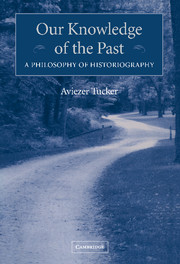Book contents
- Frontmatter
- Contents
- Our Knowledge of the Past
- Introduction: The Philosophy of Historiography
- 1 Consensus and Historiographic Knowledge
- 2 The History of Knowledge of History
- 3 The Theory of Scientific Historiography
- 4 Historiographic Opinion
- 5 Historiographic Explanation
- 6 The Limits of Historiographic Knowledge
- 7 Conclusion: Historiography and History
- References
- Notes
- Index
5 - Historiographic Explanation
Published online by Cambridge University Press: 09 July 2009
- Frontmatter
- Contents
- Our Knowledge of the Past
- Introduction: The Philosophy of Historiography
- 1 Consensus and Historiographic Knowledge
- 2 The History of Knowledge of History
- 3 The Theory of Scientific Historiography
- 4 Historiographic Opinion
- 5 Historiographic Explanation
- 6 The Limits of Historiographic Knowledge
- 7 Conclusion: Historiography and History
- References
- Notes
- Index
Summary
Unfortunately, historiographic explanation had probably been the main reason for philosophical interest in historiography within the analytic tradition from the Second World War to about 1970. However, this extensive discussion and debate (Murphey 1973, pp. 67–100) had been largely misguided. Practically all the participants in the philosophic debates about explanation have been asking two questions about explanations of descriptions of events:
What are the defining properties of such explanatory propositions?
What justifies explanations of descriptions of events?
Usually, philosophers have considered the second question to be an aspect of the first question. The answer to the second question was considered a part of the answer to the first question: Philosophers analyzed the structure of the explanation of descriptions of events as composed of three parts:
A description of an event that is explained, the explanandum in Latin. Events are explained only as described or conceptualized since “any token event has an infinitely large number of descriptions true of it” (Ruben, 1990, p. 105).
A description of an event or events that purport to explain (1), the explanans in Latin.
An extra something that connects (2) with (1), justifies their association and thereby answers the second question.
The philosophical debate centered on the nature of (3) that extra something, whether it is a law of nature, a rule, a statistical correlation, a causal mechanism, a narrative, as so on. The logical structure that characterizes explanation appeared to hinge on the exact nature of (3).
- Type
- Chapter
- Information
- Our Knowledge of the PastA Philosophy of Historiography, pp. 185 - 207Publisher: Cambridge University PressPrint publication year: 2004

